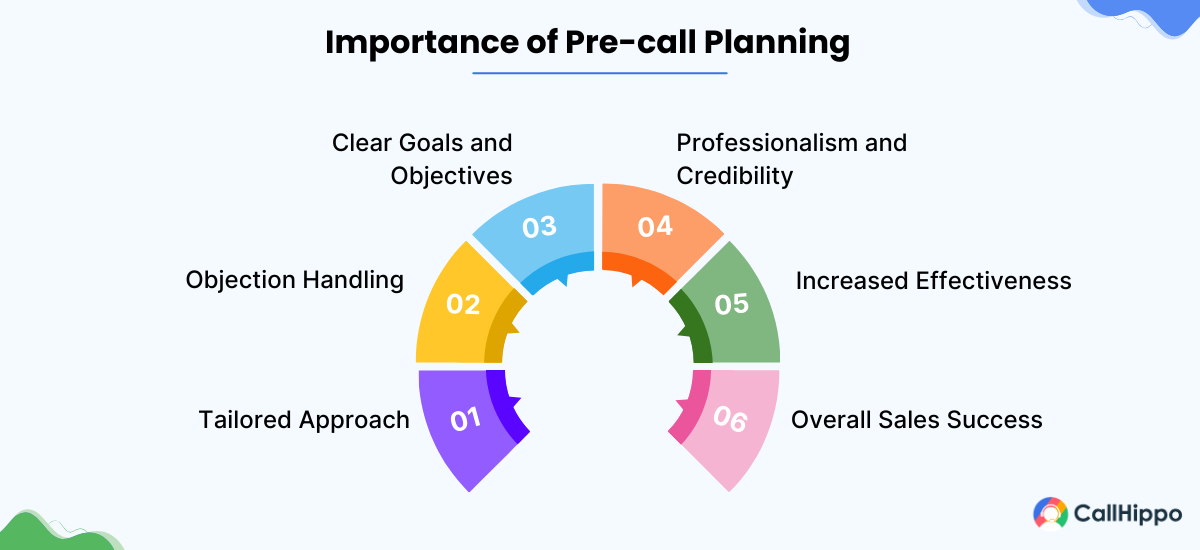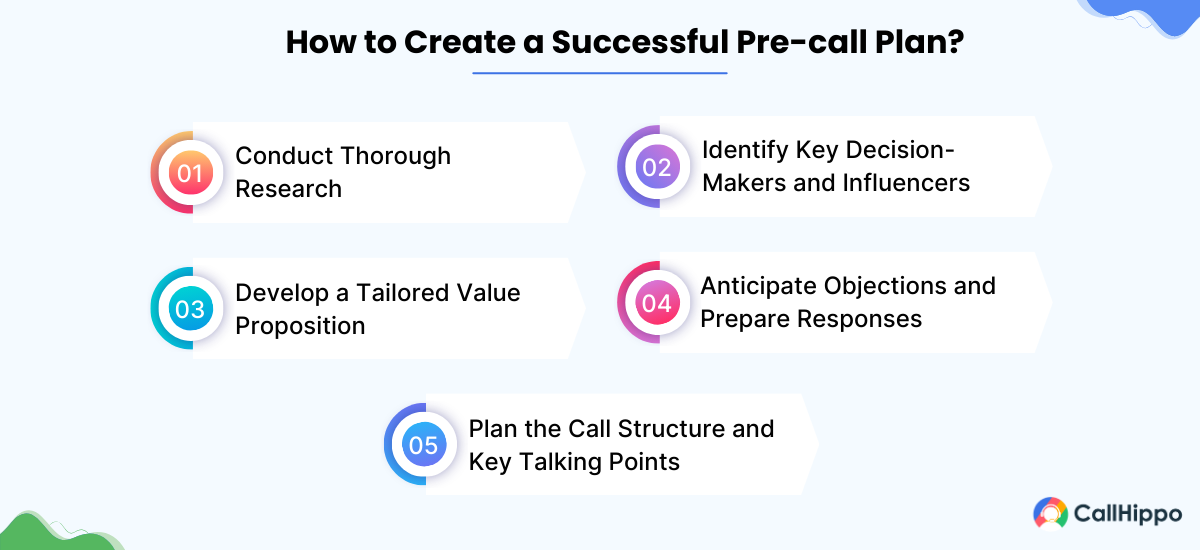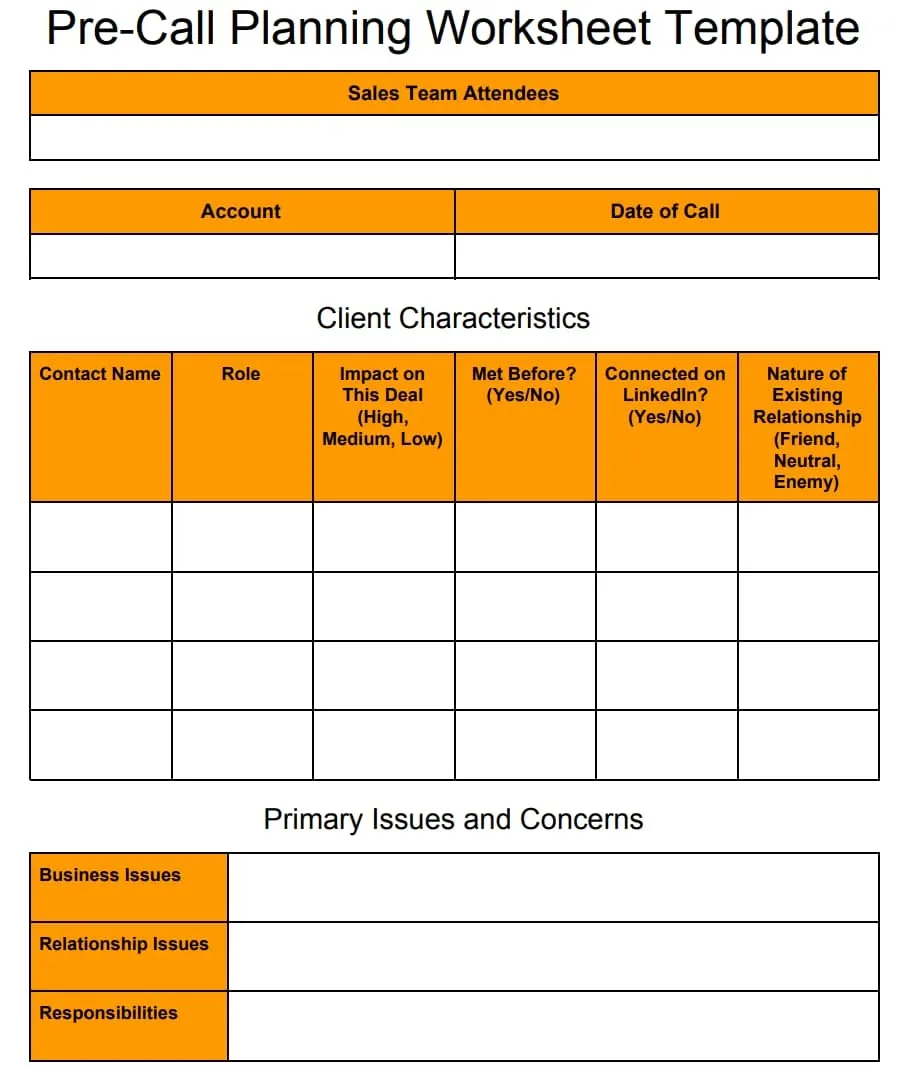Cold-calling potential clients is a daunting task for any sales team, often leading to rejections, hang-ups, and frustrations. With a cold calling average success rate of merely 2%, sales reps struggle to capture prospects’ attention, convey their value proposition effectively, and navigate objections within a short window.
However, the key to successful cold calling lies in adopting a structured approach to pre-call planning. Whether you’re a seasoned sales professional or a beginner, this comprehensive guide will equip you with a detailed framework, tips, a customizable sales pre-call planning template, and a real-world example to streamline your pre-call planning process.
After each sales call, send a follow-up email to the prospect. This email should summarize the key points discussed and outline any agreed-upon next steps. This practice serves two important purposes: first, it ensures that all parties involved remain informed and aligned, and second, it provides a foundation for planning and preparation for the subsequent call or meeting.
What Is Pre-Call Planning?
Pre-call planning refers to the comprehensive process of researching and preparing for a sales call or meeting before it takes place. It involves gathering pertinent information about the prospective client, their organization, industry, and any potential challenges or pain points they might be experiencing. This preparatory step enables sales representatives to tailor their approach, messaging, and value proposition to align more effectively with the specific prospect’s situation.
The pre-call planning process typically entails collecting as much relevant data as possible about the prospect, their company, industry trends, competitors, and any recent developments or news that could be significant. This research can be conducted through various sources, including the company’s website, social media platforms, industry publications, and other online resources.
Why Is Pre-Call Planning Important?
Pre-call planning is crucial because it helps sales representatives maximize the effectiveness of their sales calls and increase their chances of success. Let’s understand how pre-call sales planning helps make successful sales calls.

1- Tailored Approach
Pre-call planning allows sales representatives to tailor their approach to each prospect. By researching the company, industry, and potential pain points, they can craft a targeted message that speaks directly to the prospect’s unique situation. By tailoring their approach to the prospect’s unique circumstances, sales representatives increase the likelihood of capturing their attention and effectively communicating the value of their product or service.
2- Objection Handling
Thorough preparation equips sales representatives with the ability to anticipate and address potential objections or concerns that may arise during the call, enabling them to navigate these challenges more effectively.
3- Clear Goals and Objectives
Pre-call planning ensures that sales reps clearly understand their goals and objectives for the call. This focus helps them stay on track, cover all the essential points, and guide the conversation toward the desired outcome, whether it’s setting up a follow-up meeting, gathering specific information, or even closing a deal.
4- Professionalism and Credibility
When sales reps come to the call armed with relevant information and a tailored approach, it conveys a level of professionalism, preparedness, and expertise that can help build trust and credibility with the prospect.
5- Increased Effectiveness
By investing time and effort in pre-call planning, sales representatives can significantly improve the effectiveness of their sales calls. This preparation can lead to more productive conversations, better prospect engagement, and ultimately higher conversion rates.
6- Overall Sales Success
Pre-call planning is a crucial investment that contributes to overall sales success. By maximizing the impact of each interaction with potential clients through thorough preparation, sales teams can drive revenue growth and achieve their sales targets more effectively.
What Are the Benefits of Pre-Call Planning?
There are several benefits of pre-call planning for sales teams, including better engagement, higher conversion rates, a shorter sales cycle, and improved time management. There are other benefits as well. Let’s look at them.
1- Better Prospect Engagement
By researching and understanding the prospect’s business, industry, and potential challenges, sales reps can tailor their messaging and value proposition to resonate more effectively. This targeted approach increases the chances of capturing the prospect’s attention and fostering meaningful engagement.
2- Higher Conversion Rates
A well-prepared and personalized approach allows sales representatives to better understand and address the prospect’s specific needs, increasing the chances of overcoming objections and demonstrating the value proposition more convincingly. This can lead to higher conversion rates as prospects are more likely to recognize the value offered by the product or service.
3- Improved Time Management
Pre-call planning aids sales representatives in utilizing their time more efficiently by providing a structured framework for the call, ensuring they cover all essential points while avoiding unnecessary digressions. By having a clear structure and goals for the call, they can stay focused and cover all the essential points without wasting time on irrelevant discussions.
4- Enhanced Credibility and Trust
When prospects sense that the sales rep has done their homework and understands their business, it builds credibility and trust. This can be a significant advantage in establishing a strong rapport and progressing the sales process.
5- Increased Confidence
Thorough preparation boosts sales reps’ confidence. They can approach calls with a clear understanding of the prospect’s needs, potential objections, and their own value proposition, allowing them to navigate the conversation more effectively.
6- Better Objection Handling
By anticipating and preparing responses to potential objections, sales reps can address concerns more effectively and maintain the momentum of the conversation rather than being caught off guard.
7- Competitive Advantage
In a crowded marketplace, pre-call planning can give sales teams a competitive edge. By delivering a tailored and well-prepared approach, they can differentiate themselves from competitors who may take a more generic or unprepared approach.
8- Increased Productivity
With a structured and efficient pre-call planning process, sales reps can maximize their productivity by focusing their efforts on high-quality prospects and minimizing wasted time on unprepared or ineffective calls.
Tips for Creating a Successful Pre-Call Plan
By investing time and effort into thorough pre-call planning, you can increase your chances of having a productive and successful sales call. Here are five tips for successful pre-call planning so you can close deals faster.

1. Conduct Thorough Research
An effective sales call requires understanding the customer and their requirements. Gather as much information as possible about the prospect, their company, industry, competitors, and recent news or developments. Use a variety of sources, such as the company’s website, social media profiles, industry publications, news articles, and online forums for pre-call research.
The goal is to build a comprehensive understanding of their business landscape, challenges, and opportunities. This research will provide valuable insights that you can use to tailor your approach and messaging during the call.
2. Identify Key Decision-Makers and Influencers
Research the key decision-makers and influencers you’ll be speaking with, including their roles, responsibilities, backgrounds, and any publicly available information about their interests or priorities. Understanding their perspectives and pain points will help you craft a more personalized and compelling pitch. Additionally, identify any potential gatekeepers or stakeholders who may need to be involved in the decision-making process.
3. Develop a Tailored Value Proposition
Based on your research on the prospect’s company, industry, and potential challenges, craft a clear and compelling value proposition. This should directly address their specific pain points, opportunities, or areas of concern. Highlight how your product or service can deliver tangible benefits and solve their unique problems.
Use language, examples, and industry-specific terminology that resonates with their business context. A well-tailored value proposition demonstrates your understanding of the prospect’s needs, increasing the likelihood of capturing their attention and interest.
4. Anticipate Objections and Prepare Responses
Effective sales calls are the ones where you answer common objections with ease. Thus, during pre-call planning, consider potential objections, concerns, or roadblocks the prospect may raise. These could relate to cost, implementation challenges, competitive offerings, or other factors that might prevent them from moving forward.
Develop well-thought-out responses that directly address these objections and provide solutions or reassurance. Having these responses prepared in advance will allow you to navigate objections smoothly and maintain the momentum of the conversation.
5. Plan the Call Structure and Key Talking Points
Outline the flow and structure of the call, including an attention-grabbing opening, key talking points to cover, questions to ask the prospect, and a strong closing that sets the stage for the next step in the sales process. The best sales calls always have a clear structure and roadmap, which will help you stay focused, cover all the essential elements, and guide the conversation effectively.

Template for Pre-Call Planning
A sales pre-call planning template is crucial for organizing sales strategies effectively. It ensures thorough preparation, saving time and maintaining consistency in approach. Our sales pre-call planning template is designed to guide you through every step of the preparation process, from defining objectives to handling objections and measuring success. Increase your chances of achieving your desired outcomes and build stronger relationships with your prospects and clients.

Examples of Pre-Call Planning
Here are two pre-call plan examples of how to use the sales pre-call planning template shown above to your advantage.
1. Selling Inventory Management Software to a Manufacturing Company
Here’s a pre-call planning example of Sarah using a structured approach to effectively engage XYZ Corporation, address their concerns, and move them further down the sales funnel.
Sales Representative: Sarah
Prospect: XYZ Corporation (Fortune 500 Company in the Manufacturing Sector)
The Objective of The Call
- Introduction of our new inventory management software.
- Identify pain points related to inventory management.
- Schedule a demo to showcase how our software can address their specific needs.
Prospect Information
- Company Name: XYZ Corporation
- Industry: Manufacturing
- Pain Points/Challenges: High inventory carrying costs, inefficient inventory tracking leading to stockouts, and lack of real-time visibility into inventory levels.
- Primary Competitors: ABC Software Solutions, DEF Inventory Management System
Opening the Call
- Introduction: Hello, this is Sarah from Inventory Solutions. I hope you’re doing well today.
- Purpose of the Call: I’m reaching out to discuss how our new inventory management software can help XYZ Corporation streamline its inventory processes and reduce costs.
Relevant Questions
- Questions for Prospect: Could you tell me more about your current inventory management system and any pain points you’re facing?
- Anticipated Questions: I anticipate they might ask about pricing and implementation timelines.
Tailored Messaging
- Personalized Messaging: Based on XYZ Corporation’s industry and size, our software can provide real-time visibility into inventory levels, optimize reorder points, and reduce carrying costs.
- Value Proposition: Our software offers customizable dashboards and analytics, enabling proactive decision-making to prevent stockouts and improve inventory turnover.
Handling Objections
- Potential Objections: They may raise concerns about the integration with existing systems or the learning curve for employees.
- Response Strategies: We’ll emphasize our seamless integration capabilities and provide information on our comprehensive onboarding and training support.
Success Metrics
- Key Performance Indicators: This call’s success will depend on securing a commitment for a demo and identifying specific pain points to address.
- Tracking: We’ll track the conversion rate of calls to demos scheduled and monitor the progress of XYZ Corporation’s implementation post-demo.
2. Selling Organic Food to a Retail Chain
This pre-call plan provides John with a strategic framework for engaging ABC Retail Chain, addressing their concerns, and positioning the organic food products as a valuable addition to their offerings.
Sales Representative: John
Prospect: ABC Retail Chain (Regional Grocery Store Chain)
The Objective of the Call
- Introduce a new line of organic food products.
- Understand ABC Retail Chain’s current sourcing practices.
- Secure a commitment for a product demonstration.
Prospect Information
- Company Name: ABC Retail Chain
- Industry: Retail (Grocery)
- Pain Points/Challenges: Meeting increasing consumer demand for organic products, maintaining competitive pricing, and ensuring product quality and freshness.
- Primary Competitors: DEF Distributors, GHI Organic Suppliers
Opening the Call
- Introduction: Hello, John speaking. I hope you’re having a great day.
- Purpose of the Call: I’m reaching out to discuss our new line of organic food products and how they could benefit ABC Retail Chain’s offerings.
Relevant Questions
- Questions for Prospect: Could you share how ABC Retail Chain currently sources organic products?
- Anticipated Questions: I anticipate they might ask about pricing, delivery logistics, and certifications for our organic products.
Tailored Messaging
- Personalized Messaging: Given ABC Retail Chain’s commitment to offering quality products, our organic food line ensures freshness and meets growing consumer demands for healthier options.
- Value Proposition: Our organic products are sourced from trusted suppliers, ensuring high quality and compliance with industry standards. They can enhance ABC Retail Chain’s reputation as a provider of premium, health-conscious products.
Handling Objections
- Potential Objections: They may express concerns about pricing compared to non-organic alternatives or logistical challenges in integrating new products into their inventory.
- Response Strategies: We’ll emphasize the value proposition of our organic products, highlight potential profit margins, and offer support in product placement and marketing strategies.
Success Metrics
- Key Performance Indicators: This call’s success will depend on securing a commitment for a product demonstration and gathering insights into ABC Retail Chain’s current sourcing practices.
- Tracking: We’ll track the conversion rate of calls to product demonstrations scheduled and monitor the progress of ABC Retail Chain’s integration of our organic products into their inventory.
Conclusion
Pre-call planning is an essential component of a successful sales strategy. By investing time and effort into thorough preparation before each sales call or meeting, sales representatives can significantly increase their chances of engaging prospects, addressing their specific needs, and ultimately closing more deals.
It is crucial to remember that pre-call planning is an ongoing process that requires continuous improvement and adaptation. Maintaining a competitive edge in the ever-evolving sales landscape necessitates regularly reviewing and refining your approach, incorporating feedback, and staying up-to-date with industry trends and best practices.
FAQs
1. What information should I gather during pre-call planning?
During pre-call planning, it’s crucial to gather comprehensive information about the prospect. This includes details about their industry, current pain points, and primary competitors. Additionally, defining clear objectives for the call, crafting personalized messaging, anticipating potential objections, and planning insightful questions are essential steps to ensure a productive and engaging conversation.
2- Is pre-call planning necessary for every sales interaction?
Absolutely, pre-call planning lays the foundation for successful sales interactions. By organizing strategies, addressing prospect needs, and anticipating potential challenges, sales professionals can significantly increase their chances of achieving desired outcomes and building stronger relationships with prospects.
3- How far in advance should I plan for a sales call?
It’s advisable to plan sales calls at least a day in advance. This allows ample time for thorough research on the prospect, crafting tailored messaging, and making any necessary logistical arrangements. Sales professionals can then approach each call with confidence and readiness, maximizing the opportunity for a fruitful conversation.

Subscribe to our newsletter & never miss our latest news and promotions.









